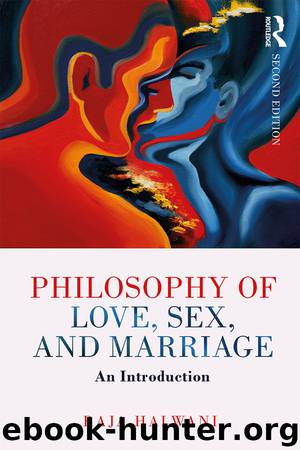Philosophy of Love, Sex, and Marriage by Raja Halwani

Author:Raja Halwani
Language: eng
Format: epub
Publisher: Taylor & Francis (CAM)
Consequentialism and Prostitution
Even if two (or more) adults consent to a sex act and the other caveats are satisfied, it may still be that the sex act, especially as part of a practice, has pernicious results. Prostitution is an apt example here because even if prostitutes and their clients consent to sex, practice safe sex, and so on, female prostitution in general might nonetheless abet and help the bad consequence of entrenching sexism. (Pornography faces a similar charge.) It would then be morally wrong according to consequentialism. Let us consider one attempt at such an argument by the philosopher Laurie Shrage.
Shrage argues that because of the way prostitution is understood, practiced, and culturally framed in the United States and similar Western societies, its continued existence leads to pernicious results, namely the perpetuation of “the marginalization of people of color and women in the U.S. and elsewhere” (1994, 125). If prostitution has these effects in US society, and if not offset by beneficial ones, prostitution would be condemned on consequentialist grounds. In what follows I discuss issues pertaining to women in general, not to women or other people of color in particular.
Shrage argues that there are four cultural “principles” (or “beliefs”) that “shape commercial sexual transactions and condition our attitudes to them” (1994, 127). These beliefs, despite being false, support prostitution (and prostitution, in turn, supports them) and imply the lower status of women. Because these beliefs refer to women’s (supposed) lower nature, their symbiotic relationship with prostitution leads to the continued existence of both the beliefs and prostitution. This is a bad consequence for women. Before we proceed with the argument, keep in mind three issues necessary for evaluating Shrage’s argument. The first is whether it is true that our culture has these beliefs and whether, if we have them, they are indeed false (whether it is true that we have false beliefs, basically). The second is how these beliefs help support prostitution and how prostitution helps support them. The third is whether the beliefs are really pernicious to women.10
The first belief is that of a universal, hard-to-control powerful sex drive, as especially found in men. Shrage argues that this belief is false because other cultures do not experience sexual desire as powerful and hard to control. She gives the example of the Dani people in New Guinea, who, after the birth of a child, forgo sexual activity for a number of years without stressing out about it. She concludes that the Western belief used to rationalize and tolerate prostitution—the belief in a powerful sex drive—is “a purely cultural phenomenon” (1994, 129).
Shrage’s argument against the belief in a universal sex drive is inconclusive, because the example of the Dani is singular and not treated in depth. We need additional examples of peoples who don’t experience the sex drive as Westerners supposedly do (or think they do); after all, the Dani could have a powerful sex drive but, for cultural and other reasons, control or repress it better than Westerners do (Shrage acknowledges this; 1994, 129).
Download
This site does not store any files on its server. We only index and link to content provided by other sites. Please contact the content providers to delete copyright contents if any and email us, we'll remove relevant links or contents immediately.
The remains of the day by Kazuo Ishiguro(8951)
Tools of Titans by Timothy Ferriss(8347)
Giovanni's Room by James Baldwin(7302)
The Black Swan by Nassim Nicholas Taleb(7090)
Inner Engineering: A Yogi's Guide to Joy by Sadhguru(6776)
The Way of Zen by Alan W. Watts(6578)
Asking the Right Questions: A Guide to Critical Thinking by M. Neil Browne & Stuart M. Keeley(5741)
The Power of Now: A Guide to Spiritual Enlightenment by Eckhart Tolle(5730)
The Six Wives Of Henry VIII (WOMEN IN HISTORY) by Fraser Antonia(5488)
Astrophysics for People in a Hurry by Neil DeGrasse Tyson(5170)
Housekeeping by Marilynne Robinson(4421)
12 Rules for Life by Jordan B. Peterson(4292)
Double Down (Diary of a Wimpy Kid Book 11) by Jeff Kinney(4252)
The Ethical Slut by Janet W. Hardy(4233)
Skin in the Game by Nassim Nicholas Taleb(4224)
Ikigai by Héctor García & Francesc Miralles(4219)
The Art of Happiness by The Dalai Lama(4116)
Skin in the Game: Hidden Asymmetries in Daily Life by Nassim Nicholas Taleb(3977)
Walking by Henry David Thoreau(3941)
